
We conventionally view causality moving from “Point A” to “Point B,” a straight line through which we can trace each step and assess responsibility. Even if we move from points “A” to “D” we still think in terms of lines of responsibility, which pass through points “B” and “C.” The framework of our legal system firmly rests on this principle of causality; that whatever the motivation, be it greed, jealously, anger, compassion or so forth, we are responsible for each of our actions and their effects on others.
Scientifically minded, our culture seeks to establish causality through a seemingly systematic and empirical process of truth finding, thereby assessing blame to the guilty and imposing forms of restitution or punishment. While motive is considered, its impact on legal findings is relevant only insofar as it pertains to ascertaining responsibility; motive is otherwise irrelevant except possibly when sentence is pronounced and accordingly is closely associated with mercy or vengeance.
The Greek philosophers of 2,500 years ago split culture from nature and in doing so established public society as distinct from the natural world. Alongside this split they established our simple conceptual bias of effective causality, severing the unfathomable interdependence of total causality between humans and nature. Discarded were oracles, divination, and the various magical practices, which had hitherto connected society to a mysterious and mystical natural world.
Causality was effectively reduced to the efficient; the only meaningful reality of human culture was that which could be observed, and if observable, responsibility for each event could ultimately be deduced. The age of logic with its fact-based personal causality was firmly established. Accordingly, “The fault, dear Brutus, is not in our stars,” says Shakespeare’s Cassius in ‘Julius Caesar’, “but in ourselves, that we are underlings.”
Though individual responsibility and blame remain iconic features of modern society, people nonetheless ascribe mysterious forces to contemporary situations. Author Harold Innis observed that an effect of any new human artifact, be it physical or imaginary in its origination, is the retrieval and reintroduction of earlier artifacts. Thus, acts of retrieval in our fact-based culture result in popular astrology appearing in the daily newspaper and in the spreading popularity of gambling casinos. Dice, of course, have their origin in six-sided knucklebones used by ancient people during acts of fortune telling.
The effects of modern commerce are no exception. Commerce began with barter, invented accounting and has culminated in centralized systems like Citibank. Yet in an act of retrieval we now have EBay, an artifact harkening back to the older decentralized bidding dynamic of public commerce. The entire concept of “The Free Market” is an act of retrieval: the ascribing of a mysterious, near-magical force to commerce, which manifests as an invisible, self-correcting system of unfailing natural wisdom. It’s downright mythological.
That such magical thinking persists alongside graduated tax schedules, government subsidies, zoning laws and corporate accounting rules gives testimonial to how stubbornly we cling to the comfort of faith in unerring, otherworldly powers.
Perhaps the lesson in all this is that we must re-balance the power of both points of view; both human culture and natural law influence outcomes. Our U.S. prison population is now the largest in the world; simple, rational causality is a terribly harsh master and the time has come for us to accept the comparatively complex kindness of mercy.